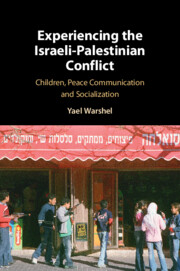Book contents
- Experiencing the Israeli-Palestinian Conflict
- Experiencing the Israeli-Palestinian Conflict
- Copyright page
- Dedication
- Contents
- Figures
- Tables
- Acknowledgments
- Note on the Text
- Abbreviations
- Introduction
- Part I The Encoding and Production of Israeli and Palestinian Sesame Street
- Part II Audience Reception of Israeli and Palestinian Sesame Street
- Part III Situating the Reception of Israeli and Palestinian Sesame Street in Mundane, Intractable Conflict Zone Practices
- Part IV Conclusions and Recommendations to Improve Peace Communication Research, (Evidence-Based) Practice and Conflict Intractability Interpretation
- Introduction to Part IV: The Best Case
- 10 Lessons Learned and Their Application to Peace Communication Research, (Evidence-Based) Practice and Conflict Intractability Interpretation
- 11 How to Improve Potential Media Effects and Impacts
- 12 Follow-Up Study of Tween-Age Former Audience Members
- Book part
- References
- Index
- Plate Section (PDF Only)
12 - Follow-Up Study of Tween-Age Former Audience Members
from Part IV - Conclusions and Recommendations to Improve Peace Communication Research, (Evidence-Based) Practice and Conflict Intractability Interpretation
Published online by Cambridge University Press: 08 July 2021
- Experiencing the Israeli-Palestinian Conflict
- Experiencing the Israeli-Palestinian Conflict
- Copyright page
- Dedication
- Contents
- Figures
- Tables
- Acknowledgments
- Note on the Text
- Abbreviations
- Introduction
- Part I The Encoding and Production of Israeli and Palestinian Sesame Street
- Part II Audience Reception of Israeli and Palestinian Sesame Street
- Part III Situating the Reception of Israeli and Palestinian Sesame Street in Mundane, Intractable Conflict Zone Practices
- Part IV Conclusions and Recommendations to Improve Peace Communication Research, (Evidence-Based) Practice and Conflict Intractability Interpretation
- Introduction to Part IV: The Best Case
- 10 Lessons Learned and Their Application to Peace Communication Research, (Evidence-Based) Practice and Conflict Intractability Interpretation
- 11 How to Improve Potential Media Effects and Impacts
- 12 Follow-Up Study of Tween-Age Former Audience Members
- Book part
- References
- Index
- Plate Section (PDF Only)
Summary
The penultimate chapter details a follow-up study in 2011, updating the now tween aged children’s political opinions regarding resolution of the conflict and inter-grouping attitudes. Importantly but perhaps not surprisingly, the Arab/Palestinian-Israeli children, the bicultural bilingual hybrid product of the conflict, alone, endorsed a single bi-national Israeli-Palestinian state. They are best poised for successfully negotiating it. Strategically, they see such a bi-national state as everyone’s, arguing for the need to work together to protect it. To that end, the book concludes by recommending PeaceComm practitioners not just target them, but encourage Arab/Palestinian Israeli media and conflict management practitioners to be the ones doing the targeting. Peacebuilding should be incorporated into existing child development practices to help leverage such outcomes, fostering this grouping’s identity, as state minority citizens-in-the-making, into peacebuilders-in-the-making. The success of PeaceComm, and more broadly, making and sustaining positive and holistic peace, the author concludes, are dependent on understanding, addressing and empowering such bicultural mediators-in-the-making to bring about change. The conflict is political not personal to them. Policy-relevant political beliefs must be addressed should media impacts restructuring social, political, economic and military structures be achieved.
Keywords
- Type
- Chapter
- Information
- Experiencing the Israeli-Palestinian ConflictChildren, Peace Communication and Socialization, pp. 404 - 412Publisher: Cambridge University PressPrint publication year: 2021



